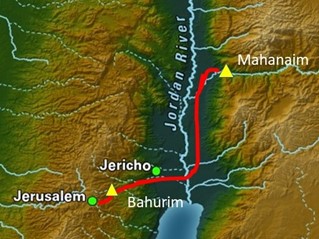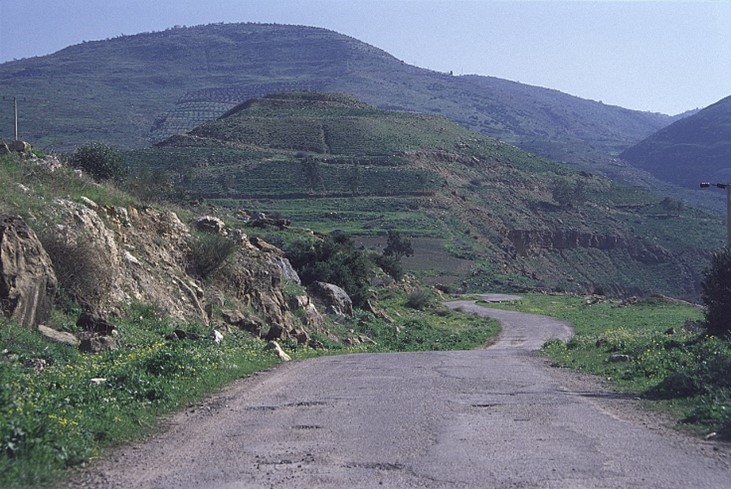This is another psalm without a superscription. Despite its brevity, it is highly significant. Moreover, it is an excellent example to us of how to respond to severe distress. In Finis Dake’s Annotated Bible it is given the title, ‘Eleventh Prayer of Distress’, whilst the New King James Version heads it with, ‘Prayer to God in Time of Trouble’. Neither title offers clues about the circumstances, so we must go to the text itself to find evidence as to who wrote it or what provoked it.
Before we do that, however, let’s look at the structure of this very personal prayer. Although it only has five verses, we can divide it into three sections:
• Verses 1-2 The Psalmist in Trouble
• Verses 3-4 The Psalmist’s Plea and Promise
• Verse 5 The Psalmist’s Self-discipline
A sense of abandonment
Though there are several requests in the first section, such as “vindicate me”, “plead my cause”, and “deliver me”, the focus is much more upon troubles: “an ungodly nation”, “the deceitful and unjust man”, and “the oppression of the enemy”. The second verse is even accusatory, saying to God, “Why do you cast me off? Why do I go about mourning?” There can be no doubt that the psalmist’s circumstances are deeply agonising. His sense of abandonment is starkly profound. The word he chooses for his lamentation is not the usual one, but is ‘qadar’, which means ‘to be dark and gloomy’. He is in utter despondency.
Alienation
In the second section, in which he pleads for guidance from God, he longs to be brought “to your holy hill, and to your tabernacle”, and promises that he “will go to the altar of God” and praise him “on the harp”. This implies the psalmist’s dislocation, his alienation from well-loved and familiar surroundings and it is this section in particular that encourages us to identify David as the psalmist with some degree of certainty. The expression, “your holy hill”, is clearly reminiscent of the sixth verse of Psalm 2, in which God himself declares, “I have set my king upon my holy hill of Zion”, and it was mainly in David’s lifetime that the Tabernacle was on that holy hill. In fact, it was David’s capture of “the stronghold of Zion” that gave rise to the term “the City of David” (2 Sam. 5:7; 1 Kings 8:1), which became Jerusalem. Moreover, David’s expertise and affinity with “the harp” are so well known as to almost need no mention.
There can be no doubt that the psalmist’s circumstances are deeply agonising. His sense of abandonment is starkly profound.
The next step in our exploration is to see if there are events in David’s life that match the troubles expressed here. In the first section we noted that “the oppression of the enemy” was related to “an ungodly nation” and to “a deceitful and unjust man”. These form the principal external elements of his distress, the cause of his alienation. The Hebrew behind these expressions helps us to unpack the psalmist’s circumstances a little more. At first, we might imagine that the “ungodly nation” refers to one of the pagan neighbouring countries, and this may be reinforced by his choice of the Hebrew noun ‘goy’, which normally signifies a Gentile people. However, in describing the nation as “ungodly” he uses an unexpected phrase, ‘lo chasid’, meaning ‘not pious, not reflecting God’s character’ (the word ‘rasha’ – wicked, criminal - is usual). ‘Chasid’ is a profoundly Jewish concept, signifying, piety, kindness and godliness: members of one prominent branch of Orthodox Judaism, fully committed to keeping Torah and performing good deeds beyond the Law’s requirements are known today as ‘Hasidim’. It is certain that David would not have expected ‘chasid’ characteristics of any Gentile nation, hence his emphasis on their lack points to his dismay at the behaviour of his own people, to the extent that he can even call them heathen!
When this condition is coupled with “oppression of the enemy” and “a deceitful and unjust man” it is strongly suggestive of the rebellion of Absalom, his beloved son1. Details of the deceit which preceded outright rebellion are found in 2 Samuel 15:1-12, where Absalom’s departure for Hebron was falsely justified, allegedly to fulfil a vow made to the Lord. It also entailed the strange promise that “If the Lord brings me back to Jerusalem then I will serve the Lord” (v.8). Here Absalom cloaked his real intention, which was to declare himself king in Hebron, with highly spiritual camouflage! David was cruelly deceived and it seems that such was his sense of betrayal he could not even utter his son’s name! And anyone supporting Absalom’s rebellion would have rejected God’s choice of national leader: remember Psalm 2:6?2
Fleeing rebellion Davids flight from Absalom
Davids flight from Absalom
The rebellion which ensued drove David and most of his household from Jerusalem, across the Kidron brook to the east and over the Mount of Olives. Initially, even faithful Priests and Levites, bearing the Ark of the Covenant, fled with him across the Kidron, but David commanded their return to their rightful place in the Tabernacle (2 Sa 15:24-28). Once over the Mount of Olives, David and his entourage headed for the wilderness plains of Jericho. As well as members of his household, there were “Cherethites” and “Pelethites” plus “600 Gittites”. The first two of these groups may have been foreigners, but their literal meaning is simply ‘guardsmen’ and ‘couriers’, and they appear in the outline of David’s royal administration, given in 2 Samuel 8:15-18. However, it is clear that the Gittites were indeed foreigners, as men from the Philistine city of Gath, the former home of Goliath. How ironic it was that at this stage David’s earthly protection was mainly in the hands of pagan Gentiles. What a contrast to his own perfidious, ‘lo chasid’, nation!
Along the Jericho road down to the plains, they stopped at a place called Bahurim for respite, possibly awaiting further news from the city. We know from its superscription that Psalm 3 was written by David “when he fled from Absalom”, and it seems as if this is a very early response, confessing his initial woes, but also declaring his trust in the Lord. Verse 5 of that psalm stands out as testimony: “I lay down and slept: I awoke, for the Lord sustained me”. This would comfortably fit the overnight stop at Bahurim, where David and his retinue “refreshed themselves there” (2 Sam. 16:14). It was here, too, that Jonathan and Ahimaaz brought news of Hushai’s clever prevention of Absalom’s immediate pursuit, persuading him of the need to gather more troops, and thus taking pressure from David (2 Sa 17).
 Probable site of Mahanaim, photo credit: E. Refeld, WikiCommonsDavid, taking the opportunity to travel safely, now withdrew with his supporters, across the River Jordan, heading northwards to Mahanaim in the valley of the River Jabbok. Here, in this steep-sided valley, in a defensively-walled and double-gated city3, he was much more secure from attack, and that from one direction only, from the West. Moreover, loyal local people gave the necessary provisions to support them (2 Sam. 17:27-29). David and his officers now had opportunity to consider his army’s strategy against the forces of Absalom (2 Sam. 18:1-6). Nonetheless, he is in unfamiliar surroundings, some 60 miles of rough terrain from home, as well as being separated from the spiritual support of Zadok, the High Priest, and of his three worship leaders, Asaph, Heman and Jeduthun. Mahanaim is thus the most likely setting of the alienation expressed in Psalm 43. The picture below illustrates the strategic position nicely, the ancient fortified city having been located on the summit of the hill in the middle distance, as approached from the Jordan valley. Despite its security, how isolated David must have felt. And yet, one wonders if he found encouragement from the fact that it was here that Jacob encountered angels (Gen 32:1).
Probable site of Mahanaim, photo credit: E. Refeld, WikiCommonsDavid, taking the opportunity to travel safely, now withdrew with his supporters, across the River Jordan, heading northwards to Mahanaim in the valley of the River Jabbok. Here, in this steep-sided valley, in a defensively-walled and double-gated city3, he was much more secure from attack, and that from one direction only, from the West. Moreover, loyal local people gave the necessary provisions to support them (2 Sam. 17:27-29). David and his officers now had opportunity to consider his army’s strategy against the forces of Absalom (2 Sam. 18:1-6). Nonetheless, he is in unfamiliar surroundings, some 60 miles of rough terrain from home, as well as being separated from the spiritual support of Zadok, the High Priest, and of his three worship leaders, Asaph, Heman and Jeduthun. Mahanaim is thus the most likely setting of the alienation expressed in Psalm 43. The picture below illustrates the strategic position nicely, the ancient fortified city having been located on the summit of the hill in the middle distance, as approached from the Jordan valley. Despite its security, how isolated David must have felt. And yet, one wonders if he found encouragement from the fact that it was here that Jacob encountered angels (Gen 32:1).
God's light and truth
In making his complaints known to God in this psalm, David also prays for deliverance from his plight (v.1). As an antidote to injustice and deception, as well as a means of guidance, he pleads, “Oh send out your light and truth, let them lead me” (v.3). There, in the confines of Mahanaim, his longing is not so much the recovery of his kingdom or his authority, but access to his nation’s place of worship, the holy Tabernacle: “then I will go to the altar of God”, the place of forgiveness and reconciliation, as well as the opportunity to praise the Lord with his harp, to worship the One who is his “exceeding joy” (v.4). In making this promise, one senses that his faith is rising, his gloom dissipating, his hope triumphing. In self-discipline he speaks to himself in verse 5, the final section of the psalm. He even rebukes his own spirit: “Why are you cast down … disquieted?”, and then responds with the vigorous injunction, “Hope in God!”, and with the affirmation of faith for the future, “for I shall yet praise him”!
It is clear, therefore, that David’s response to his alienation now becomes one of steadfast, defiant faith. His optimism is in spite of, not because of his circumstances.
David’s Hebrew word for ‘hope’ is instructive, going far beyond the hope that is mere wishful thinking: ‘yachal’ at root means ‘to be patient, to wait expectantly’. It is clear, therefore, that David’s response to his alienation now becomes one of steadfast, defiant faith. His optimism is in spite of, not because of his circumstances. Though safe for the present, he is still exiled from all that he loves and the foreseeable future is fraught with danger. Here in Psalm 43 is a great lesson for us whenever we face adverse and oppressive circumstances, maybe even betrayal. Perhaps it is particularly relevant in these current days of isolation and confinement caused by the Covid pandemic. Are you experiencing some kind of alienation? Hope in God! Trust him expectantly, for, like David, you shall yet praise him!
This is the last in David's series on the Psalms. To look back at others in this series, see our archive here.
Endnotes
1 Psalm 63 has sometimes been attributed to this period, but its details fit much more comfortably with David’s much earlier flight from King Saul. See Psalm 63 (prophecytoday.uk).
2 See Psalm 2 (prophecytoday.uk).
3 2 Samuel 18:24 has this detail. Though there has been much debate about the location of Mahanaim, Tullul adh-Dhahab in modern Jordan best fits the requirements. It is the scene of the above photo. For further discussion, see Genesis 32: Jacob Prepares for Esau; Jacob Fights with a Divine Man and Becomes Israel – 929 Chapters, accessed 7 Mar 2021.




